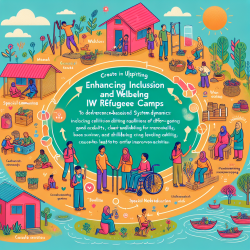In recent years, the relationship between hunger and mental health has garnered significant attention, especially among youth. A pivotal study titled "Does social support moderate the association between hunger and mental health in youth? A gender-specific investigation from the Canadian Health Behaviour in School-aged Children study" sheds light on this critical issue. This research provides valuable insights for practitioners aiming to enhance their understanding and strategies in supporting youth facing these challenges.
The Study at a Glance
The study utilized data from 21,750 Canadian youths in grades 6-10 who participated in the 2017-2018 Canadian Health Behaviour in School-aged Children survey. It explored how different sources of social support—peer, family, teacher, school climate, and neighborhood—affect the mental health of youths experiencing hunger. The research highlighted gender-specific differences in how hunger impacts mental health and examined whether social support could mitigate these effects.
Key Findings
- Youths with lower social support were more likely to experience hunger.
- All forms of social support were associated with higher mental health scores, even when accounting for hunger.
- The negative impact of hunger on mental health was more pronounced among females compared to males.
- Certain social support factors (family, teacher, and neighborhood) had a stronger positive impact on females' mental health compared to males.
- Social support did not completely alleviate the negative association between hunger and mental health.
Implications for Practitioners
For practitioners working with youths, these findings underscore the importance of fostering strong social support networks. While social support alone may not eliminate the adverse effects of hunger on mental health, it plays a crucial role in enhancing overall well-being. Here are some strategies practitioners can consider:
- Enhance Family Engagement: Encourage open communication and active involvement of family members in youths' lives to strengthen family support.
- Foster Positive School Environments: Promote a supportive school climate where students feel accepted and valued by their peers and teachers.
- Community Involvement: Engage community resources to create a supportive neighborhood environment that can provide additional layers of support.
- Gender-Specific Approaches: Tailor interventions to address gender-specific needs and responses to stressors like hunger.
Encouraging Further Research
This study opens avenues for further research into how different types of social support can be optimized to improve youth mental health outcomes. Future studies could explore additional factors that might influence the relationship between hunger and mental health or investigate long-term impacts across different demographics.
To read the original research paper, please follow this link: Does social support moderate the association between hunger and mental health in youth? A gender-specific investigation from the Canadian Health Behaviour in School-aged Children study.
The insights from this research are invaluable for practitioners seeking to make a meaningful difference in the lives of youths facing food insecurity. By understanding and leveraging social support systems effectively, we can work towards better mental health outcomes for all young individuals.










